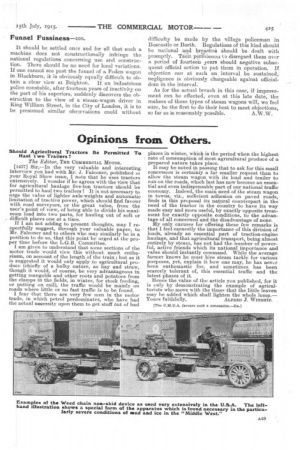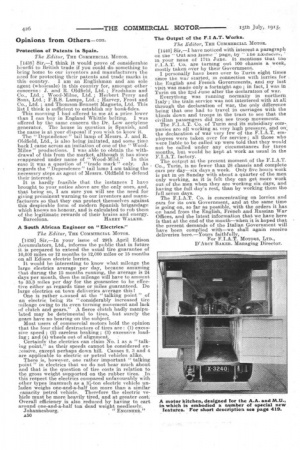Opinions front Others.
Page 17

Page 18

If you've noticed an error in this article please click here to report it so we can fix it.
Should Agricultural Tractors Haul Two Trailers ?
The Editor, THE COMMERCIAL MOTOR.
[1437] Sir,—In the very valuable and interesting interview you had with Mr. J. Falconer, published m your Royal Show issue, I note that he uses tractors extensively. I wonder if he agrees with the view that for agricultural haulage five-ton tractors should be permitted to haul two trailers 1 It is not necessary to urge the value of lighter axle-we]ghts and automatic limitation of tractive power, which should find favour with road surveyors, or the great value, from the user's point of view, of being able to divide his maximum load into two parts, for hauling out of soft or . difficult places one at a time. If I am not adding to present thoughts, may I respectfully suggest, through your valuable paper, to Mr. Falconer and to others who may similarly be in a position to do so, that this point be urged at the proper time before the L.G.B. Committee.
I am given to understand that some sections of the motor trade would view this without much enthusiasm, on account of the length of the train ; but as it is suggested it would only apply to agricultural produce (chiefly of a bulky nature, as hay and straw, though it would, of course, be very advantageous in getting marigolds and other roots and potatoes from the clamps in the fields, in winter, for stock feeding, or putting on rail), the traffic would be mainly on roads where little or no fast traffic is to be found.
I fear that there are very few men in the motor trade, in which petrol predominates, who have had the actual necessity upon them to get stuff Out of bad
Be Permitted To places in winter, which is the period when the highest rate of consumption of most agricultural produce of a, prepared nature takes place. It may be noted in passing that to ask for this small concession is certainly a far smaller request than to allow the steam wagon with its load and trailer to run on the roads, which last has now become an essential and even indispensable part of our national traffic economy. Indeed, the main need of the steam wagon in towns, viz., sufficient adhesion on paved roads, finds in this proposal its natural counterpart in the need of the tractor in the country to have its way made easy and more useful, by exactly opposite treatment for exactly opposite conditions, to the advantage of all concerned and the disadvantage of none. My only excuses for offering these few remarks is that I feel earnestly the importance of this division of loads, already an essential part of traction-engine haulage, and that agricultural transport, being almost entirely by steam, has not had the number of powerful, active friends which its national importance and value should instantly command. While the average farmer knows he must hire steam tackle for various purposes, yet, explain it how one may, he has never been enthusiastic for, and sometimes has been scarcely tolerant of, this essential traffic and the latest phases of it. Hence the value of the article you published, for it is only by demonstrating the example of agriculturists who move with the times that the little leaven may be added which shall lighten the whole lump.— Yours faithfully, ALFRED J. WINSHIP.
[The C.M.U.A. favours wok) a concession.—Ea.)
Protection of Patents in Spain.
The Editor, THE COMMERCIAL MOTOR.
[1438] Sir,—I think it would prove of considerable benefit to British trade if you could do something to bring home to our inventors and manufacturers the need for protecting their patents and trade marks in this country. I am an Englishman and am sole agent (wholesale) in this country for, amongst other concerns : J. and R. Oldfield, Ltd. ; Frodshain and Co., Ltd. ; Wood-Milne, Ltd. ' • Herbert Perry and Sons, Ltd. ; F.R.S. Lamps, Ltd. ; Harvey, Frost and Co., Ltd. ; and Thomson-Bennett Magneto, Ltd. This list I think is sufficient to establish my boni-fides.
This morning I had offered to ins at a price lower than I can buy in England Whittle belting. I was
offered by the same concern the Dr, Low acetylene generator. The house in question is Spanish, and the name is at your disposal if you wish to know it. The "Dependence" tail lamp of Messrs_ J. and R. Oldfield, Ltd., is also being imitated, and some time back I came across an imitation of one of the " Wood Mime" productions. I was able to obtain the with drawal of this from the market, although it has since reappeared under name of "Wood-Mild." In this case it was a question of 'trade mark" only. As regards the " Dependence" tail lamp I am taking the necessary steps as agent of Messrs. Oldfield to defend their interests, It is hardly feasible that the instances I have brought to your notice above are the only ones, and, that being so, I am sure you will see the need for giving prominent warning to our inventors and manu facturers so that they can protect themselves against this despicable form of modern Spanish brigandage which knows no honour, and is calculated to rob them of the legitimate rewards of their brains and energy.
Barcelona. HARRY WALKER.
A South African Engineer on " Electrics."
The Editor, THE COMMERCIAL MOTOR.
[1439] Sir,—In your issue of 29th April Edison Accumulators, Ltd., informs the public that in future it is prepared to extend the usual tire guarantee of 10,000 miles or 12 months to 12,000 miles or 15 months on all Edison electric lorries.
It would be interesting to know what mileage the large eleetrics average per day, because assuming that during the 15 months running, the average is 24 days per month, then the mileage will have to amount to 33.3 miles per day for the guarantee to be effective either as regards time or miles guaranteed. Do large electrics on town deliveries average this?
One is rather amused at the "talking point" of an electric being its "considerably increased tire mileage owing to its even turning movement and lack of clutch and gears." A fierce clutch badly manipulated may be detrimental to tires, but surely the gears have no bearing on the subject. Most users of commercial motors hold the opinion that the four chief destructors of tires are : (1) excessive speed ; (2) careless braking ; (3) excessive loading; and (4) wheels out of alignment.
Certainly the electrics can claim No. 1 as a " talking point," as their speeds cannot be considered ex:essiye, except perhaps down hill. Causes 2, 3 and 4 are applicable to electric or petrol vehicles alike.
There is, however, one rather important "talking point" in electries that we do not hear much about and that is the question of tire costs in relation to the gross weight supported on the rubber tires. In this respect the electincs compared unfavourably with other types inasmuch as a 31-ton electric vehicle unladen weighs one-and-a-half ton more than a similar capacity petrol vehicle. Therefore the electric vehicle must be more heavily tired, and at greater cost. Overall efficiency is also reduced by having to cart around one-and-a-half ton dead weight needlessly. Johannesburg. " ENGINEER." A50
The Output of the Fl A.T. Works.
The Editor, THE COMMERCIAL MOTOR.
[1440] have noticed with interest a paragraph
on the " Out and .11011146 page; by Inc katiaractoi, ' • in. your issue of 17th June. It mentions that tne Co. are turning out 100 chassis a week, mostly taken over by their Government. I personally have been over to Turin eight times since the war started, in connection with lorries for . the English and French Governments, and my last visit was made only a fortnight ago ; in fact, I was in Turin on the 2na June after the declaration of war. .
Everything was running normally in northern Italy.; the train service was not intertered.with at all through the declaration of war, the only difference being that one had to travel in carriages with the blinds down and troops in the train to see that the civilian passengers did not see troop movements. The F.I.A.T. Co. of Turin and its subsidiary companies are all working at very high pressure, and on the declaration of war very few of the F.I.A.T. employees were taken over for service ; all those who were liable to be called up were told that they would not be called • under any circumstances for three months, but would be kept at work as usual in the F.I.A.T. factory. The output at the present moment of the F.I.A.T. Co., Turin, is no fewer than 28 chassis and complete cars per day—six days a week. Only five hours work is put in on Sunday with about a quarter of the men only working, as it is felt they can get more work out of the men when they are working six days, and having the full day's rest, than by working them the full seven days.
The F.I.A.T. Co. is concentrating on lorries and cars for its own Government, and at the same time is going on, so far as possible, with the orders it has on hand from the English, French and Russian War Offices, and the latest information that we have here is that at the end of the month—when it is hoped that the present demands of the Italian Government will have been complied with—we shall again receive deliveries here.—Yours faithfully, For F.I.A.T. MOTORS, LTD., D'ARCT BAKER. Managing Director.




















